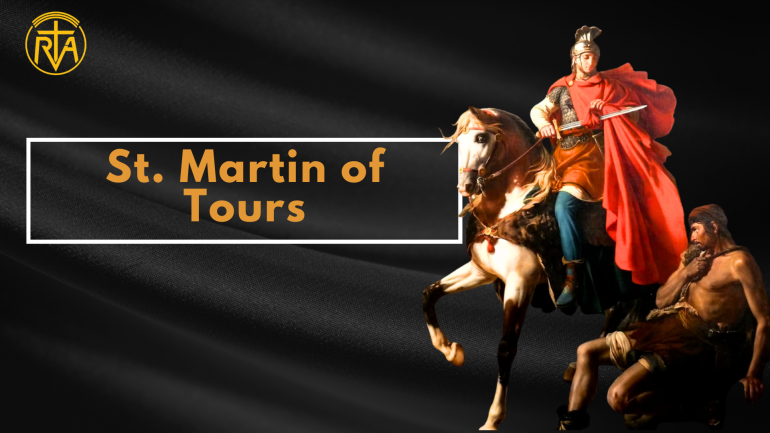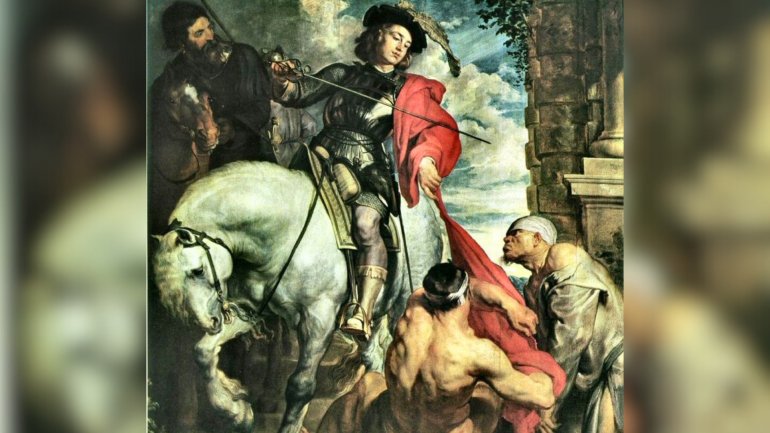St. Martin of Tours: Model of Humility, Service, and Compassion

St. Martin of Tours stands as one of the most beloved saints in Christian tradition, remembered not for grand displays of power but for the quiet depth of his compassion and humility.
Born into a world of military authority and imperial power, Martin chose instead the path of service, mercy, and spiritual devotion. He is venerated as a patron of the poor, soldiers, conscientious objectors, and those seeking a more just and compassionate society.
His legacy continues to inspire individuals to embrace empathy and selflessness in a world that often leans toward self-interest and division.
Brief Life Sketch
St. Martin was born in 316 A.D. in Sabaria (modern-day Szombathely, Hungary) in the Roman Empire. His father was a senior officer in the Roman army, and thus Martin, by tradition, was required to join military service. Even as a child, Martin felt a strong pull toward Christianity, a religion still emerging from persecution and misunderstanding. At the age of ten, he sought to become a catechumen and began preparing for baptism; however, he entered the Roman army at the age of fifteen, following an imperial decree.
Martin served as a cavalry officer in Gaul (modern France). Even while in military service, his heart remained inclined toward peace, generosity, and care for others. The most famous moment of his early life came when he encountered a shivering beggar at the gates of Amiens. With no money to give, Martin cut his military cloak in half and shared one half with the man. That night, he saw a vision of Christ wearing the very same piece of cloak, affirming Martin’s act of charity. This encounter profoundly changed him, and he was baptized at the age of eighteen.
Eventually, Martin left military service, believing he could no longer fight or shed blood. He sought spiritual guidance from St. Hilary of Poitiers and later became a monk. In 371 A.D., despite his reluctance, the people of Tours acclaimed him as their bishop. Martin continued to live simply, founding monasteries, evangelizing rural areas, and caring personally for the poor. He died in 397 A.D., and his feast is celebrated on November 11.
Lesser-Known Facts about His Life
While Martin is known primarily for sharing his cloak, several lesser-known aspects of his life deepen our appreciation for his character:
• He was one of the first recognized conscientious objectors. Martin objected to participating in war on the grounds of faith, stating, “I am a soldier of Christ; I cannot fight.” Although he did not condemn soldiers, he believed his calling required him to promote peace.
• He pioneered rural evangelization in Western Europe. At a time when Christianity was strongest in cities, Martin worked among rural populations, gently teaching and gaining trust rather than imposing beliefs.
• He was known to confront injustice. Martin spoke out against cruelty in the Church and government. He even traveled long distances to advocate for those unfairly condemned.
• He lived simply, even as a bishop. Most bishops of the time lived comfortably and wielded influence. Martin chose monastic simplicity and preferred to serve the poor directly.
Key Moments in His Life Journey
Several significant events shaped Martin’s spiritual path and legacy:
• The Cloak of Amiens, The Act of Kindness: This moment symbolized Martin’s lifelong dedication to compassion. The vision of Christ affirmed his belief that serving others is, in fact, serving God.
• Baptism and Renunciation of the Army: After his baptism, Martin recognized that his calling was incompatible with combat. He sought a peaceful expression of his faith, even at personal cost.
• Life with St. Hilary of Poitiers: Martin learned theology, discipline, and pastoral care under St. Hilary. This mentorship strengthened his conviction to spread the Gospel.
• Foundation of Marmoutier Monastery: This monastery became a center of Christian learning, reflection, and mission work, influencing many future leaders.
• Appointment as Bishop of Tours: Though he resisted the honor, Martin’s leadership transformed the region. He advocated for compassion in dealing with heresy, arguing that conversion must come through love, not force.
• His Death and Veneration: When Martin died, two groups debated where he should be buried, his monks and the people of Poitiers. His body was ultimately taken to Tours, where his tomb became a place of pilgrimage.

Relevance for the Modern World
St. Martin of Tours offers lessons that resonate powerfully in today’s world.
• Compassion in Action: His life teaches that charity is not merely giving out of abundance but sharing even when one has little. His cloak-sharing moment remains a universal symbol of human kindness.
• Peace-making and Nonviolence: In a world marked by conflict and aggression, Martin’s commitment to peace encourages us to seek nonviolent solutions and promote reconciliation.
• Humility in Leadership: Martin redefined leadership as service. His life invites leaders today, religious, political, and social, to lead with empathy and integrity rather than power.
• Inclusivity and Respect: Martin evangelized by example, not coercion. In a time divided by cultural, political, and ideological boundaries, his approach reminds us that persuasion through love and dialogue is more lasting than force.
• Care for the Marginalized: Martin focused on the poor, forgotten, and rural populations. His example encourages us to reach beyond comfort zones and advocate for justice and dignity for all.
Legacy of Caring and Sharing
St. Martin of Tours remains a timeless witness to the transformative power of compassion, humility, and service. His life invites us to reflect on how we treat those around us, how we use the resources entrusted to us, and how deeply we live the values we profess. In an age where self-promotion often overshadows service, and division overshadows unity, Martin’s legacy shines like a quiet but steady light.
His story reminds us that holiness does not require extraordinary circumstances, only a heart willing to love. Whether through great acts or simple gestures, we, too, are called to share our “cloak” with those in need. By doing so, we honor not only the memory of St. Martin but also the deeper call to humanity that lies within each of us.










And also I thank God for gift of Rev,fr. Ashok for sharing his wisdom and knowledge which God has given .
It's really wonderful and inspiring to everyone I believe.
Thank you so much.
- Reply
Permalink